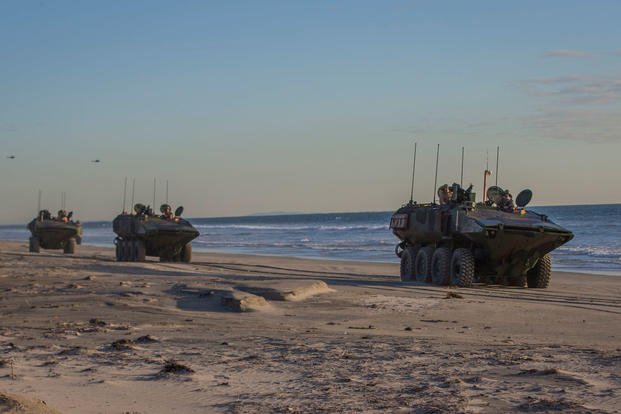SAN DIEGO (AP) — The Marine Corps on Friday halted waterborne operations for its new amphibious vehicle that resembles an armored seafaring tank after identifying a problem with its towing mechanism.
Marine Corps spokesman Maj. Jim Stenger said the decision was made “out of an abundance of caution.”
The Amphibious Combat Vehicle was obtained by the Marine Corps last year to replace the Vietnam-era Amphibious Assault Vehicle, or AAV, which suffered problems. Last year, eight Marines and one sailor were killed off the coast of San Diego inside an AAV after becoming trapped inside the tank.
Marine Corps leaders after the July 2020 accident vowed to make safety a bigger priority.
The break in waterborne operations come a day after the families of the eight Marines and one sailor filed a lawsuit in Los Angeles against the manufacturer, BAE Systems.
“Realistic training is a vital component of readiness, and the Marine Corps is committed to ensuring Marines train under the safest conditions possible; this includes ensuring the functionality of vehicles and equipment," Stenger said in a statement Friday.
Lawyer Eric Dubin, who is representing the families, has said BAE Systems knew for a decade or more about a design defect that makes it nearly impossible for troops to open the cargo hatches and escape the 26-ton amphibious vehicles when they sink.
The troops last summer were trapped inside for 45 minutes before the vehicle, known as an AAV, sank.
An investigation by the maritime branch found the accident off San Clemente Island was caused by inadequate training, shabby maintenance of the 35-year-old amphibious assault vehicles and poor judgment by commanders.
BAE Systems also was selected by the Marine Corps to make the new vehicles or ACVs, which the military started receiving last year.
BAE Systems has declined to comment on the lawsuit.
The vehicles have been at the heart of the Marine Corps’ amphibious operations, carrying troops from ship to shore for both combat and humanitarian operations since the early 1980s. It can traverse both land and sea.










